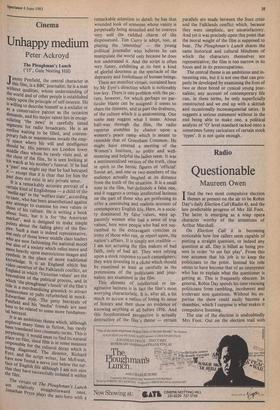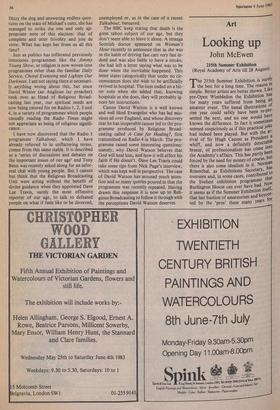Radio
Questionable
Maureen Owen
T find the two most compulsive election 1 themes at present on the air to be Robin Day's daily Election Call (Radio 4), and the less predictable progress of Mrs Jill Foot. The latter, is emerging as a soap opera character worthy of the attentions of Arthur Marshall.
On Election Call it is becoming noticeable how few callers seem capable of putting a straight question, or indeed any question at all. Day is billed as being pre- sent in order `to see fair play'. From this one assumes that his job is to keep the politicians to the point. Instead his role seems to have become that of an interpreter who has to explain what the questioner is getting at. This is frequently obscure. In general, Robin Day spends his time rescuing politicians from rambling, incoherent and irrelevant non questions. Without his ex- pertise the show could easily become a shambles, which I suppose is what makes it compulsive listening.
The star of the election is undoubtedly Mrs Foot. Out on the election trail with Dizzy the dog and answering endless ques- tions on the state of Michael's suits, she has managed to strike the one and only ap- propriate note of this election: that of complete and utter frivolity and joie de vivre. What has kept her from us all this time?
Just as politics has infiltrated previously innocuous programmes like the Jimmy Young Show, so religion is now woven into programmes other than the familiar Daily Service, Choral Evensong and Lighten Our Darkness. I am not saying there is necessari- ly anything wrong about this, but since David Winter (an Anglican lay preacher) took over as Head of Religious BrOad- casting last year, our spiritual needs are now being catered for on Radios 1, 2, 3 and 4, in a variety of programmes which people casually reading the Radio Times might not appreciate as being of religious signifi- cance.
I have now discovered that the Radio 1 programme Talkabout, which I have already referred to in unflattering terms, comes from this same stable. It is described as a 'series of discussions and debates on the important issues of our age' and Tony Benn was recently asked along for an infor- mal chat with young people. But I cannot but think that the Religious Broadcasting Unit were acting without the benefit of divine guidance when they appointed Dave Lee Travis, surely the most offensive reporter of our age, to talk to defeated people on what if feels like to be divorced, unemployed or, as in the case of a recent Talkabout, bereaved.
The BBC keep stating that death is the great taboo subject of our age, but they don't seem able to leave it alone. A strange Scottish doctor appeared on Woman's Hour recently to announce that as she was in the habit of driving fast cars very fast in- deed and was also liable to have a stroke, she had left a letter saying what was to be done when the inevitable happened. This letter states categorically that under no cir- cumstances does she wish to be artificially revived in hospital. The item ended on a bit- ter note when she added that, knowing hospitals as she does, they will probably ig- nore her instructions.
Canon David Watson is a well known and well liked Evangelist who has led mis- sions all over England, and whose discovery that he has inoperable cancer led to the pro- gramme produced by Religious Broad- casting called A Case for Healing?, first transmitted on Radio 4 in March. The pro- gramme raised some interesting questions: namely, why David Watson believes that God will heal him, and how it will affect his faith if He doesn't. Dave Lee Travis could take some tips from Nick Page's interview, which was kept well in perspective. The case of David Watson has aroused much atten- tion and so many queries poured in that the programme was recently repeated. Having drawn this response it is now up to Reli- gious Broadcasting to follow it through with the perceptions David Watson deserves.















































 Previous page
Previous page